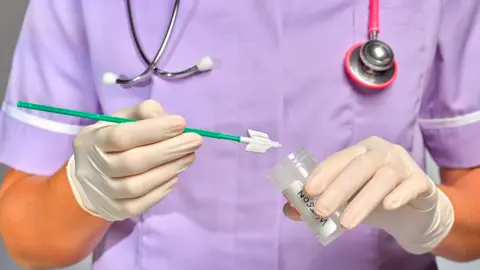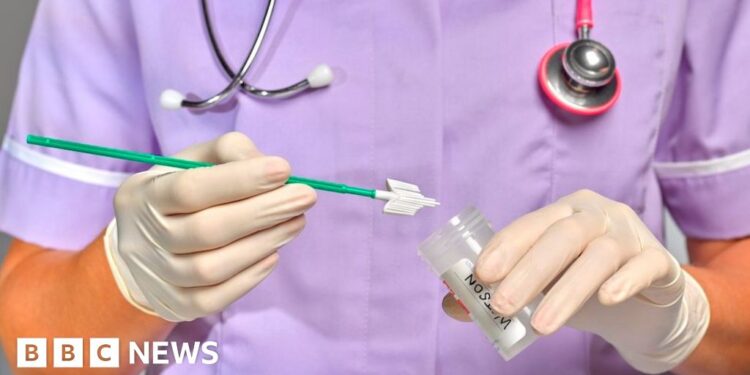 Getty Images
Getty ImagesWomen who have delayed coming forward for cervical screening will be offered a test to be taken at home, NHS England has said.
The DIY test kits, available from January, contain a long cotton-wool bud to swab the lining of the vagina.
The test is for human papillomavirus (HPV), which causes most cervical cancers, and women between the ages of 25 and 64 are offered it every few years.
But more than five million women aren’t up to date with the test, according to the government.
The Department for Health and Social Care in England said the scheme would tackle “deeply entrenched barriers” that keep women away from cervical screening.
This can be due to embarrassment, discomfort, lack of time as well as religious or cultural concerns.
Just 68.8% of women currently take up the offer of cervical cancer screening – well below the NHS England target of 80%.
Younger women, those with a disability, ethnic minority communities and LGBT+ groups are more likely to miss appointments.
A recent trial showed the rollout of home test kits across England could increase the proportion screened to 77% over three years.
The Department of Health said women who had rarely or never attended cervical screening would be offered a self-sample kit to complete at home.
The kits are sent out “in discreet packaging” and the return postage is pre-paid.
The test checks for HPV alone, but if that’s detected then women will be invited for to see a doctor who will check for cell changes which could indicate cancer.
Health and Social Care secretary Wes Streeting said: “We know the earlier cancer is diagnosed the better the chances are of survival.
“By making screening more convenient, we’re tackling the barriers that keep millions of women from potentially life-saving tests.”
Michelle Mitchell, chief executive of Cancer Research UK, said “beating cervical cancer means beating it for everyone” adding that at-home testing “helps to bring us closer to that goal”.
‘I’m absolutely thrilled’
Hazel Stinson, 49, from Kent, suffers from chronic fatigue syndrome and was last able to visit the GP for a cervical screening six years ago.
She says she is “absolutely thrilled” that at-home testing is being rolled out across England.
“This will mean that I and millions of other people just like me will be able to have the test when otherwise they might not be able to do it,” she added.
Ms Stinson said as someone with chronic fatigue, which is also known as myalgic encephalomyelitis or ME, “the most important thing is to advocate for yourself”.
She says she has always been left “feeling fearful” that her inability to attend the GP regularly for tests like cervical screening could really affect her health.
“I’m unwell enough as it is – I really don’t want anything else on top of this,” she explained.
Main symptoms of cervical cancer
- vaginal bleeding that’s unusual for you – including during or after sex, between periods or after the menopause – or heavier periods than usual
- changes to vaginal discharge
- pain during sex or in the lower back, lower tummy or between the hip bones (pelvis)
Source: NHS
Source link : https://www.bbc.com/news/articles/czxe8g98vq8o
Author :
Publish date : 2025-06-23 23:58:00
Copyright for syndicated content belongs to the linked Source.











